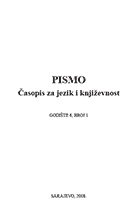The subclasses of the open class degree adverbs in English
The subclasses of the open class degree adverbs in English
Author(s): Kamiah Arnaut-KarovićSubject(s): Language and Literature Studies
Published by: Bosansko filološko društvo
Keywords: degree adverbs; intensifiers; adverbs of quantity/measure; passive participles; complementary distribution
Summary/Abstract: This paper shall discuss the open class degree adverbs usually treated as a single class of adverbs. Assuming that the open class degree adverbs are not a single category I claim that they split up into two separate subclasses: – intensifiers – modifying only adjectives and passive participles with adjectival reading and – adverbs of quantity/measure that may modify only verbs and passive participles with verbal reading and that these two subclasses of the open class degree adverbs may occur only in complementary distribution. 1. The codes for five cities will change completely. - VP 2. This can become completely invisible. – AP 3. completely devastated parents – passive participle with adjectival reading 4. a completely finished hull – passive participle with verbal/passive reading Given that all open class degree adverbs share the identical morphological form, the same or almost the same semantic content, and the same distribution, they seem to comply with all linguistic criteria to be considered as a single class of adverbs. In this paper I shall propose the appropriate linguistic tests providing the evidence in support of the claim previously stated. The tests proposed in this paper will straightforwardly account for the phenomenon that the open class degree adverb such as completely in the examples from (1) through (4) do not fall into the single class but split up into the subclasses stated in the hypothesis. Since passive participles, too, may have different interpretation and either adjectival or verbal/passive reading when used as attributes, the open class degree adverbs are tested at the level of participial phrase used attributively at the level of the NP.
Journal: Pismo - Časopis za jezik i književnost
- Issue Year: 2008
- Issue No: 06
- Page Range: 78-95
- Page Count: 18
- Language: English

